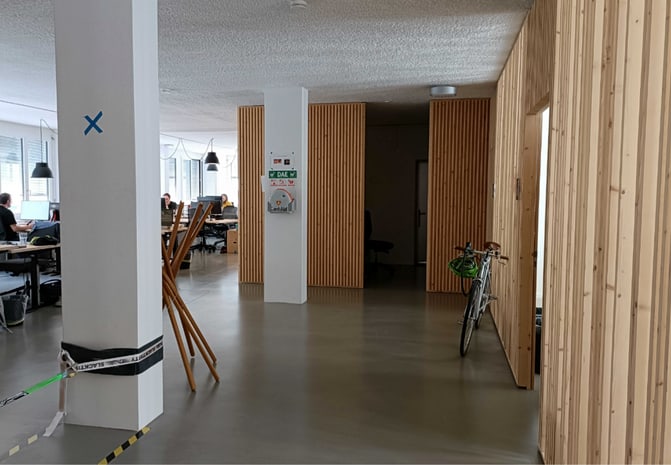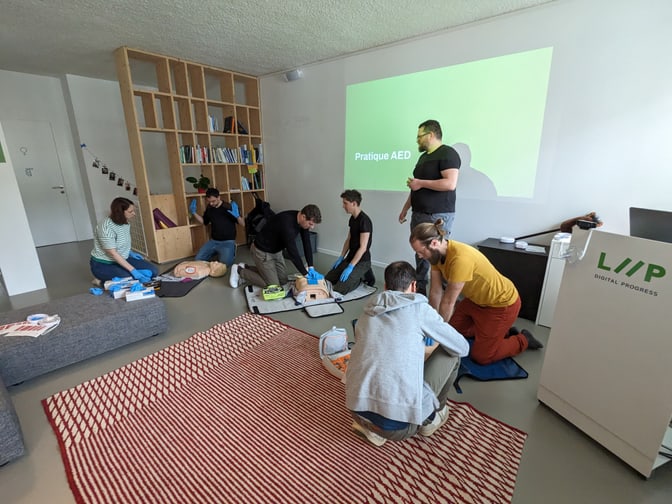I’m a Liiper used to putting out fires
My name is Tristan. I’m 36 years old, have two children, and have been a volunteer firefighter with Oron-Jorat Emergency Services for over 12 years. I work at night, on weekends, and even during the day, since I’ve been working from home. Our flexibility at Liip allows me to do that without affecting my work.
I’m also registered with the FirstResponder network, which alerts first aiders close to people suffering cardiopulmonary arrest. This means that CPR (cardiopulmonary resuscitation) can be given before the ambulance arrives, which can take ten or even twenty minutes, depending on the location.

I’ve been at Liip since 2018. I worked as backender on web applications (PHP and Ruby) for a long time before switching to developing mobile applications, particularly on the Android platform. I’m also a Scrum Master. Because of my role as a firefighter and first-aider, I’m very aware of safety issues.
Given our sedentary jobs, we’re at greater risk of a health incident such as a heart attack or stroke over our lifetime. If this happens, every minute counts! In fact, according to statistics, every minute the brain is starved of oxygen reduces the chances of survival by roughly 10%.
So, for me, it was obvious I needed to do something to maximise the chances of the victim's survival should anything happen at our offices. Often, only large companies train their employees in first aid, but since we work a self-organised (Holacracy) at Liip, it was easy for me to launch a project on this issue.
Defibrillators are great, but training is also necessary
My colleague Sergio, also a first aider, shared my concerns. The first thing we did was to install a defibrillator (AED) in each office that needed one (where there was no defibrillator in the building or no hospital nearby).

Having installed the AEDs, I talked to many Liipers wondering what these things were and how to use them. I realised that defibrillators weren’t enough, and some training was also required. Because I’d wanted to train as a BLS/AED (Basic Life Support/Automated External Defibrillator) instructor for several years, I decided to use my personal training allowance which we get every year at Liip, to get trained.
I got my IAS 1 and IAS 2 certifications, which are non-professional first-aid training, and my BLS/AED instructor certification. With these certifications under my belt, all that remained was putting together courses for Liipers and that was no mean feat!
To receive the BLS/AED compact or generic provider certification, the courses must be approved and certified by the SRC (Swiss Resuscitation Council), the organisation that implements the first aid directives for the whole of Switzerland.
In early autumn 2023, the courses Sergio and I had implemented were certified, and we were able to start organising training sessions: firstly in Lausanne, then in Fribourg and soon after at our Bern and Zurich offices.

That day over thirty Liipers received first aid training, roughly one-sixth of our workforce.The same number will be trained before summer. All of these training hours are paid by Liip.
We’re also planning crash courses or short presentations for the second half of the year on different aspects of first aid that we don’t necessarily cover in the BLS/AED compact training courses.
Here are some sample topics:
- What to do in the event of an epileptic seizure
- How to treat cuts and fractures
- How to handle emergencies involving children
After reading this article, you will probably want to take a first aid course or refresh your knowledge. Here are several useful links to help you find training near you:
choc-securite.ch
formamed.ch
redcross-edu.ch
save-a-life.ch
It is important that as many people as possible get trained in first aid to save as many lives as possible.
